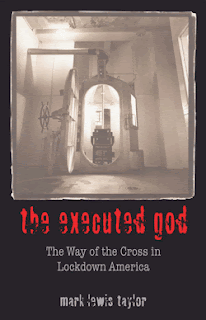- The whole thing about sacrifice in the Bible. Animals sacrificed in the Old Testament; Jesus sacrificed. I don’t see why God just can’t forgive without a sacrifice.
- If Jesus was not born of a virgin (that being a myth) then he is not God's begotten son, and could not be expected to die for the sins of the world. Furthermore, if God said he didn't require sacrifice but justice, and he saved Abraham's son at the last minute, he would never require Jesus to be a human sacrifice. In fact, a God who requires any human sacrifice is repugnant to most of us. So how are we to see Jesus' death on the cross? Not as propitiation for my sin? I'd like to hear some discussion of this.
How are we to see Jesus' death on the cross?
It won't take long to offer a critique of substitutionary atonement.
Following that, I am going to offer a metaphor, "The Executed God," as a way to look at the Jesus event and the ethic that follows. The metaphor comes from a book by Mark Lewis Taylor, The Executed God: The Way of the Cross in Lockdown America.
Following that, I am going to offer a metaphor, "The Executed God," as a way to look at the Jesus event and the ethic that follows. The metaphor comes from a book by Mark Lewis Taylor, The Executed God: The Way of the Cross in Lockdown America.
Taylor writes:
The Executed God is what I think Paul means by preaching Christ Crucified. In the context of Pax Romana, the only message worthy to preach was resistance. As we open our internet browsers in 2015 and find ourselves confronted by the beast of racism, the devastation of Earth, the widening gap between wealthy and poor, the wasting of lives in our prison system, the proliferation of weapons of war all in the name of peace, freedom and progress (the wisdom of this age), The Executed God and the hope of resistance it carries must be proclaimed from our pulpits and enacted in our lives.The executed Jesus of Nazareth is not in himself some executed God, as readers might first think from this book’s title. No, the God who is executed, suffering imperial, state-sanctioned crucifixion, is presented in this book as a whole life force, a greater power, if you will, that is made up of three dynamics that were crucial to Jesus’ way of the cross: (1) being politically adversarial to religiously backed imperial power, (2) performing creative and dramatic instances of resistance to imperial power, and (3) organizing movements that can continue resistance and flourish even after imperial executioners do their worst. The executed God is a force of life that is greater than all imperial powers and thus can foment the resistance and hope that all suffering peoples need.

No comments:
Post a Comment